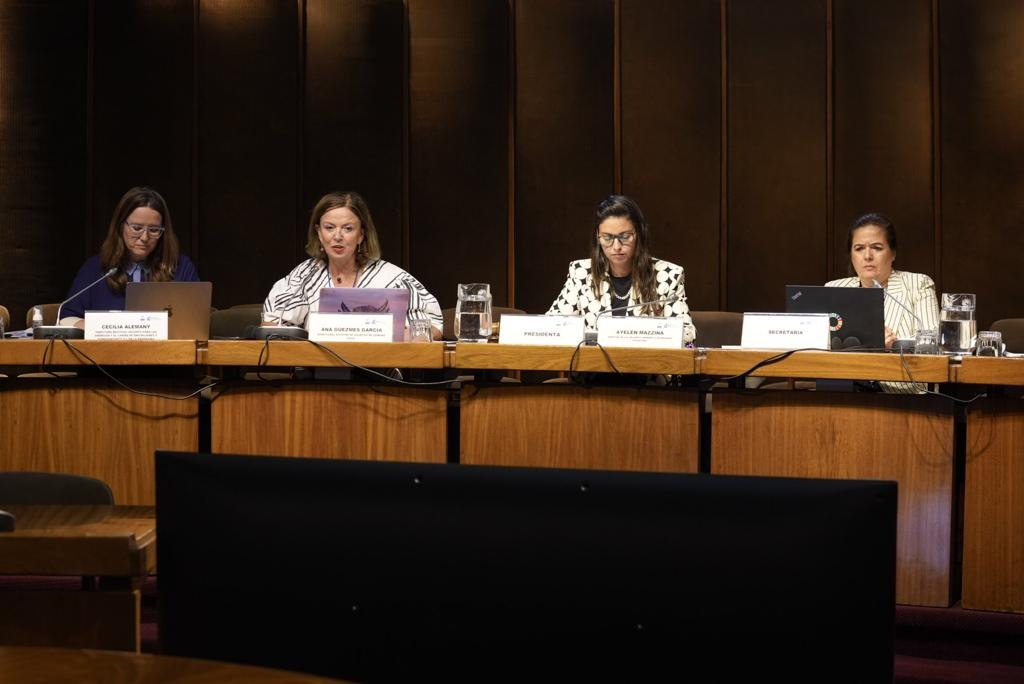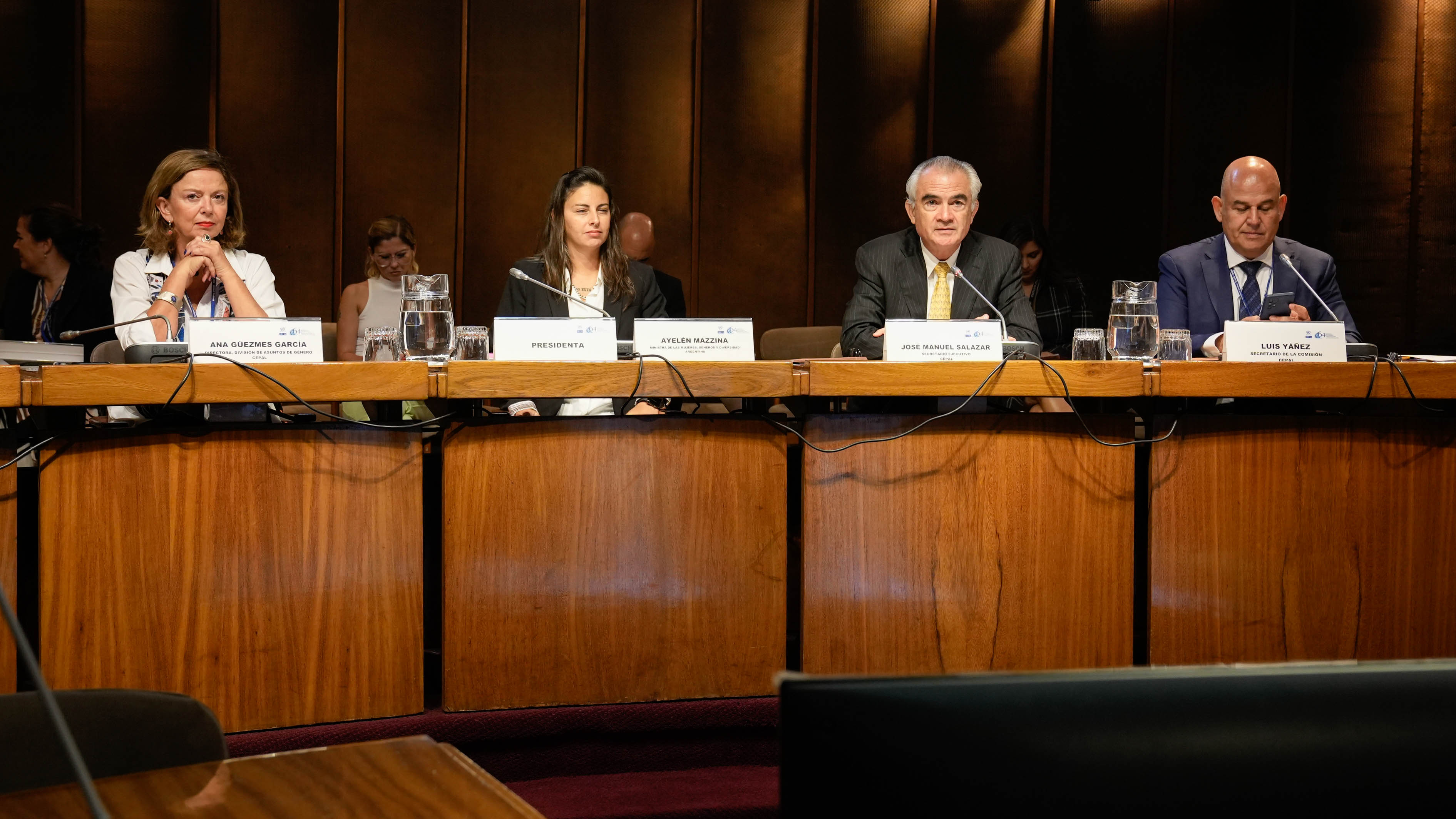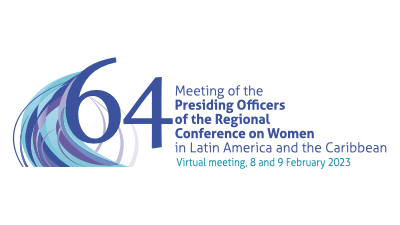The Region’s Countries Committed Themselves to Bridging the Gender Digital Divide and Ensuring Women’s Full Participation in Technological Development and Knowledge
Work area(s)
The Sixty-fourth Meeting of the Presiding Officers of the Regional Conference on Women in Latin America and the Caribbean was held virtually on February 8-9.

The region’s countries committed themselves to “promoting intersectoral public policies that include affirmative action to foster women’s and girls’ participation, continuation and completion of education in the spheres of science, technology, engineering and mathematics,” along with their full access to the emerging digital economy and its potential opportunities.
This is according to the Declaration by Ministers and High-level Authorities of the National Machineries for the Advancement of Women in Latin America and the Caribbean for the 67th Session of the Commission on the Status of Women (CSW), the main outcome of the Sixty-fourth Meeting of the Presiding Officers of the Regional Conference on Women, which took place virtually on February 8-9, 2023.
The 64th Meeting of the Presiding Officers of the Regional Conference on Women was organized by the Economic Commission for Latin America and the Caribbean (ECLAC), as Secretariat of the Conference, in coordination with the United Nations Entity for Gender Equality and the Empowerment of Women (UN Women). Participating in the event were delegations from the 15 countries that make up the Presiding Officers (Argentina, Barbados, Bolivia, Chile, Colombia, Costa Rica, Cuba, the Dominican Republic, Ecuador, Honduras, Mexico, Peru, Saint Vincent and the Grenadines, Uruguay and Venezuela), along with government officials from another 18 Member States and associate members of ECLAC and representatives of the United Nations System, intergovernmental organizations and civil society. More than 500 people participated in total, and a broad audience was reached via social media.
“In terms of the decisions made, the ministers and senior authorities from national machineries for women’s advancement in Latin America and the Caribbean reaffirmed their commitment to accelerating the effective implementation of the Regional Gender Agenda, including the Buenos Aires Commitment,” which was adopted in 2022 at the XV Regional Conference on Women in Latin America and the Caribbean, Ana Güezmes, Director of ECLAC’s Division for Gender Affairs, emphasized during the closing session.
According to this senior official, “as a region, we have a clear course for moving towards the care society which, among other benefits, would free up women’s time and relieve them of unpaid work so they can fully participate in the work environment, can get training and can access education and digital technologies on equal footing.” “As demonstrated over these two days of exchanges, the region has a clear and robust agenda of priorities. There are innovative proposals for addressing the multiple crises that undermine equality. There are bold solutions for closing gender gaps,” she underscored.
In that regard, she mentioned the agreements approved and the documents that were shared during the meeting. “These documents and agreements nourish the Regional Gender Agenda, which also offers guidelines on how to address structural inequalities and make progress on the access, use, ownership and technological innovation of women and girls in all their diversity. They allow for recovering the talent lost in the paradoxical fact that while women have higher educational completion rates than men, they are relegated in labor participation and even more so in the areas of science, technology, engineering and mathematics, as well as in innovation and in the production of scientific knowledge,” she said.
Cecilia Alemany, UN Women’s Deputy Regional Director for the Americas and the Caribbean and ad interim Representative in Argentina, stressed “the importance of enhancing regional and international cooperation in all its forms, responding to the concept promoted by Chile of a ‘tous azimuts’ cooperation and coined as ‘circular cooperation’ for an inclusive digital transition linked to the social transition and the strengthening of women’s affairs ministries, and which is set down in paragraphs 21 and 23 of the declaration agreed upon today by the governments of Latin America and the Caribbean to take to the 67th Commission on the Status of Women.”
In the Declaration, the ministers and high-level authorities agreed to “encourage subregional, regional and multilateral cooperation programmes on technological transformation and the digital ecosystem through North-South, South-South and triangular cooperation modalities, as well as between national machineries for the advancement of women, that promote gender equality and the autonomy of women in all their diversity.”
Ayelén Mazzina, Minister for Women, Gender and Diversity of Argentina and Chair of the Presiding Officers of the Regional Conference, thanked the delegations for their participation, pointing up the outcomes of the Special Regional Consultation Session prior to the 67th session of the CSW. In that regard, she called for concentrating efforts on an “education that is free of mandates and stereotypes at all levels” and on women’s greater participation in the areas of innovation, science and technology. “I trust that we will continue working to implement the Buenos Aires Commitment with policies, programs and progress towards care societies, more just societies, with more equality and more opportunities,” she emphasized.
In the Declaration, the delegates agreed to “encourage labour participation of women in all their diversity in the fields of science, technology, engineering and mathematics, eliminating occupational segregation and all forms of discrimination and gender-based violence ensuring decent work and wage equality, in particular in emerging sectors, including the digital economy, that are key to structural change with equality and the decarbonization of economies.”
Furthermore, they committed their countries to “supporting the digital entrepreneurship of women, including in e-commerce, including for micro, small and medium-sized enterprises, to develop local solutions and relevant content and promote innovation and decent job creation.”
They also resolved to have the Declaration disseminated among the Foreign Affairs Ministries of the governments of the region as Latin America and the Caribbean’s contribution to the negotiation of the conclusions that will be adopted at the 67th session of the CSW (March 6-17, 2023).
Finally, the ministers and other participants expressed gratitude for the presentation of the reference document Gender equality and women’s and girls’ autonomy in the digital era: contributions of education and digital transformation in Latin America and the Caribbean, prepared by ECLAC, UN Women, and the United Nations Educational, Scientific and Cultural Organization (UNESCO).
This report provides an assessment of women’s and girl’s participation in the digital ecosystem and makes recommendations for improving national statistics, bridging the gender digital divide and achieving women’s and girl’s digital inclusion and security, among other issues.
Related content

Bridging the Gender Digital Divide is Critical to Achieve Women’s Autonomy and Substantive Equality in Latin America and the Caribbean
Today marked the inauguration of the Sixty-fourth Meeting of the Presiding Officers of the Regional Conference on Women, which is being held virtually through Thursday.

The 64th Meeting of the Presiding Officers of the Regional Conference on Women in Latin America and the Caribbean
The 64th Meeting of the Presiding Officers of the Regional Conference on Women in Latin America and the Caribbean was held virtually from 8 to 9 February 2023.
Related event

The 64th Meeting of the Presiding Officers of the Regional Conference on Women in Latin America and the Caribbean
The 64th Meeting of the Presiding Officers of the Regional Conference on Women in Latin America and the Caribbean was held virtually from 8 to 9 February 2023.
Type
Country(ies)
- Latin America and the Caribbean
Contact
Public Information Unit
- prensa@cepal.org
- (56 2) 2210 2040
